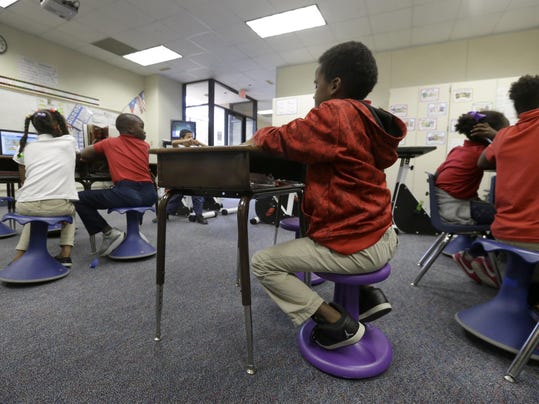
Michigan’s proposed state education plan moved a step closer Wednesday to implementation after a phone call between the Michigan Department of Education and officials from the U.S. Department of Education.
The Every Student Succeeds Act requires states to develop plans that address standards, assessments, school and district accountability and special help for struggling schools. Michigan submitted its plan in April and it is under review by the feds.
State Superintendent Brian Whiston said Michigan’s education plan will have less student testing; focus on student academic growth; institute a partnership model for improving low-performing schools and have a school accountability system tied to the Top 10 in 10 strategies. It also gives schools more flexibility on how they choose to improve and greater ownership in how they follow their own plans.
Based on the Wednesday phone call, Whiston said the federal education department will finalize its feedback letter, outlining parts of the Michigan plan that need more detail. Whiston was told by federal officials that U.S. Secretary of Education Betsy DeVos will make her determination based on the state’s compliance with federal requirements.
“We were told that the secretary’s determination will be based on compliance with the letter of the law only, and no subjective judgments on what is in the plan,” Whiston said. “This is in line with what Secretary DeVos promised about giving more flexibility and control back to the states on what they think is best for their state.”
Whiston said in addition to the technical amendments to the plan, more work will be required by state education officials to show how the state’s Transparency Dashboard will be designed and used to identify the state’s most struggling schools.
“We will get that done and back to (the U.S. Department of Education) so we can get the secretary’s determination by the end of August,” Whiston said.
In April, both Gov. Rick Snyder and Lt. Gov. Brian Calley criticized aspects of the plan. Calley asked federal officials to return the plan to Michigan to refine metrics for special education students. Snyder said he did not support one of the three accountability system proposed because it did not include letter grades for schools.
In May, state education officials were required to submit additional information on the plan to the U.S. Department of Education, which deemed eight parts to be incomplete.
In June, an independent peer review of Michigan’s education plan found it lacks the clarity and detail necessary to give the state the opportunity to improve outcomes in the classroom.
The review was a joint project between Bellwether Education Partners, an educational consultant in Washington, D.C., and the Collaborative for Student Success, a nonprofit.
Michigan’s K-12 plan lacked fundamental information in all of the nine categories evaluated, said Jim Cowen, executive director of the Collaborative for Student Success.
The state received its highest score — 3 out of 5 — in the standards and assessments category. The review says in this category, Michigan’s plan is based on strong standards as adopted by the state, “though it does not provide much information” about the alignment of its new assessments with the state’s standards and college and career readiness.
The project used the expertise of more than 30 bipartisan state and national experts to capture the strengths and weaknesses of each state’s plan. The review said Michigan can improve in other areas including goals, academic progress, supporting schools and selecting an accountability system.
According to reviewers, Michigan’s plan has proposed three accountability systems: An A-F rating system that combines measures into one overall rating for each school, an A-F rating system that reports component grades of each of six measures but does not compile those into one overall grade; or a “dashboard” that reports raw data but does not attempt to rate schools on any of the components or overall.
“Michigan states that all three of these options would include subgroup data, but only the first option would meet ESSA’s requirements that states identify schools with low subgroup performance as in need of additional support,” the review said.
[“Source-detroitnews”]




